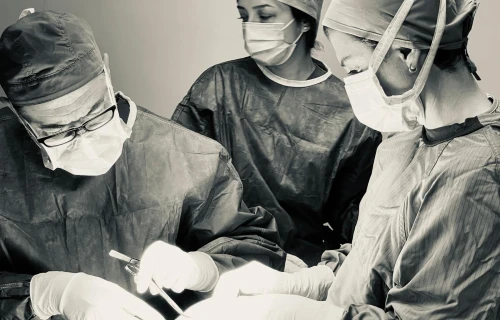Regain your confidence with the best in modern surgical solutions
Following breast trauma or removal through mastectomy or lumpectomy, it is usually possible to successfully rebuild one or both breasts to achieve a natural, balanced shape.
Breast reconstruction surgery replaces missing tissue and reshapes the breast, restoring symmetry, volume, and, most importantly, the patient’s self-confidence

At a Glance
Surgery Time
Recovery Time
Key Information
Before & After Breast Reconstruction
View Full Gallery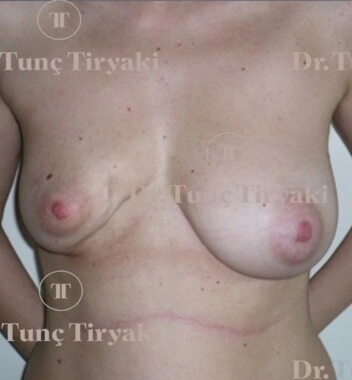
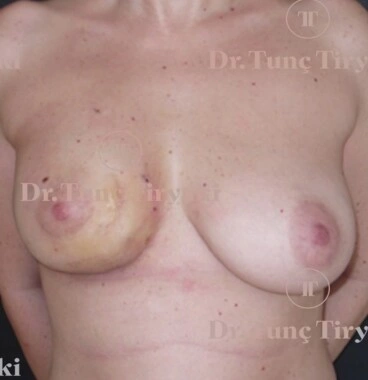
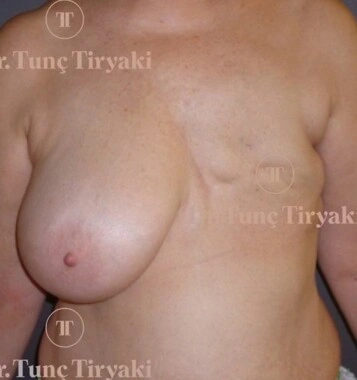
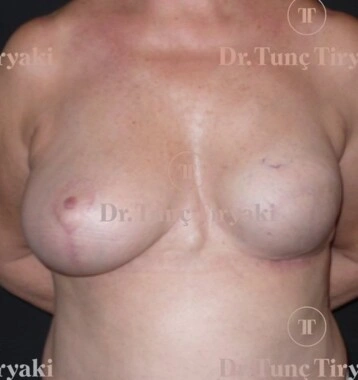
How is a Breast Reconstruction performed?
There are several methods by which breast reconstruction may be achieved, each of which may be used in isolation or in combination with one another. First, it may be possible to reconstruct an even, natural-looking shape using only the patient’s own tissue. Autologous breast reconstruction transfers tissue to the breast from another part of the body, increasing volume in the most natural way possible. However, some proportion of the tissue transferred in this way will quickly be reabsorbed by the body.
Second, the use of tissue expanders and silicone implants offers a reliable way of restoring volume. This method will result in a natural look with no risk of reabsorption. Finally, stem cell treatment is also commonly used in breast reconstruction surgery. The transfer of tissue rich in stem cells to the breast promotes regeneration and healing, the benefits of which may last for a lifetime.
The condition of the patient’s breast area and the size and shape of each breast play an important role in determining which method or combination of methods should be used. The amount and elasticity of the available skin is also important. If the amount of available skin is insufficient, particularly if the other breast is large, a tissue expander can be inserted in order to gently stretch the skin. Once the skin has expanded, the area can be repaired and filled with either an implant or the patient’s own tissue. Alternatively, if one breast is large and sagging it can be reduced and lifted during the same surgery in order to match the other.


Will breast reconstruction surgery leave any scars?
Yes. The length and location of these scars will vary depending on the technique used and the individual procedure. All incisions are made with the aim of creating thin, straight lines that will fade to a light colour within a year. Scars are generally hidden under the breasts and will become much less visible over time. Mr Tiryaki will discuss with you the number and length of the incisions necessary to obtain the ideal result at your consultation.


Breast Reconstruction with Mr Tunç Tiryaki
On your first visit, Mr Tiryaki will listen to you and learn your objectives and desires.
After examining you and evaluating your physical requirements, he will discuss with you alternative approaches to breast reconstruction surgery and answer any questions you may have.
Together you will decide which surgical approach will suit you best. All-throughout your journey starting
from your initial consultation to your recovery and follow-up, you will experience the care and warmth of Mr Tiryaki’s team.
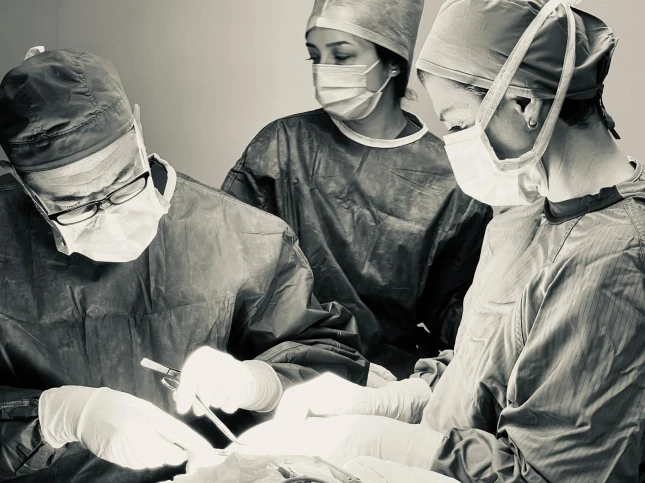
Guidelines for Surgery
The following guidelines apply for all types of surgery
- You should stop using all kinds of blood thinners.
- You should stop smoking within two weeks following the operation. You should not do any activities that will increase blood pressure.
- You should stay at the hospital overnight.
- This operation is performed under general anaesthesia.
- You may have some scars hidden under your breasts; however, these scars will become much less visible over time. If you need additional incisions, Mr Tiryaki will discuss it at your consultation.
- Implants are permanent, you do not have to change your implants in time. And also, implants do not pose a problem for breastfeeding.
- You may have mild to moderate pain, however, you can use simple painkillers. Any discomfort will disappear within a few years.
- You can take shower two or three days after the operation.
- You may have some bruising and oedema in the operational area.
- You should wear a support or sport bra for at least three weeks after the operation. Mr Tiryaki will advise the most suitable one for you.
- You should not drive a car for ten days after the operation.
- Mr Tiryaki assures you to have permanent results as long as you have a healthy diet.
- Sometimes you may need a revision or second procedure to create symmetry between the reconstructed breast.
- You should start exercising 3-6 weeks after the operation.
- Mr Tiryaki recommends regular breast check-ups.
Frequently Asked Questions
What do I need to do before my breast reconstruction?
Before a reconstruction following breast cancer, the patient’s condition must be evaluated with a general surgeon and oncologist. It is important that the breast reconstruction is performed at a time that is appropriate for the patient. As with all surgical procedures, patients must abstain from taking blood thinners and limit both alcohol consumption and smoking as much as possible. Ideally, a patient should abstain entirely from smoking and drinking alcohol in the last couple of days preceding surgery.
How long will my Breast Reconstruction take?
Breast reconstruction surgery usually takes less than three hours. Mr Tiryaki will advise the patient in advance on how long the procedure is likely to take. The procedure is performed under general anaesthetic and the patient will probably remain in hospital overnight.
What do I need to do after my Breast Reconstruction?
The patient may need to stay overnight in the hospital. The bandages are removed three days after the operation, at which point you may shower and resume most daily activities. You will need to wear a support or sport bra for three weeks, and should not drive a car for ten days following surgery. Exercise can be safely resumed after three to six weeks. We recommend regular breast check-ups. As with all surgical procedures, you should stop smoking for the duration of the two weeks following the operation, and you should not participate in any activities that will increase blood pressure.
Is Breast Reconstruction painful?
You may experience mild to moderate pain for the first few days after surgery. This can be managed with simple painkillers. You may also see some minor bruising or oedema.
Will breast reconstruction prevent breast feeding?
The bandages are removed two days after the operation, and you can shower after two or three days. You can return to normal life after about a week, but you should not drive a car for at least 10 days. We recommend wearing support or sport bras for three weeks following a breast lift. Mr Tiryaki will suggest the most suitable option. As with all surgical procedures, you should stop smoking for the duration of the two weeks following the operation, and you should not participate in any activities that will increase blood pressure.
Are the results of Breast Reconstruction permanent?
The results of breast reconstruction are permanent. Any implants are also permanent and do not need to be replaced. However, a second operation might be necessary in order to obtain a perfectly symmetrical result.
Will a Breast Reduction prevent breast feeding?
Most breast reductions will not disturb the operation of the milk ducts, as the nipples usually remain fully attached to the breasts at all times. Should a different method be necessary for an effective breast reduction, Mr Tiryaki will discuss this with you in advance. In all other cases, you should expect to be able to breastfeed normally.
Are the results from Breast Reduction permanent?
The results of a breast lift are considered permanent. The shape of the breasts will gradually settle in the three months following surgery. For the best long-term results patients should maintain a healthy weight and lifestyle, as both age and gravity may eventually change the form of the breasts. Breast implants are also permanent and do not need to be replaced.
How long is the recovery time for breast reconstruction surgery?
The healing process takes approximately three weeks, during which time the patient must wear a support or sport bra.


